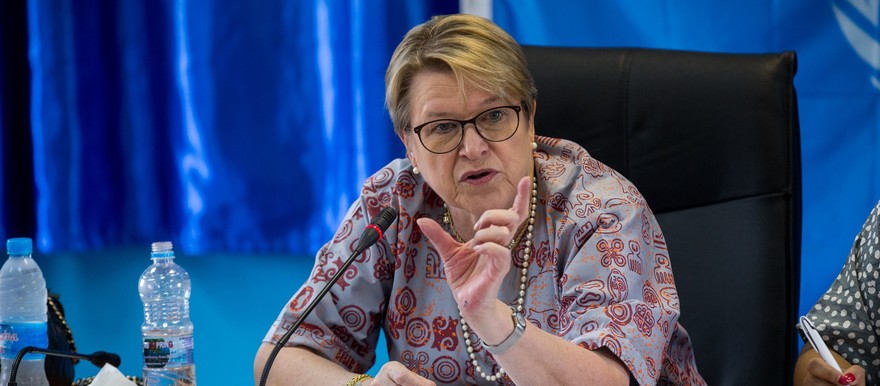Peace monitoring body JMEC and the UN Mission in South Sudan (UNMISS) say that the 28 states created by President Salva Kiir are not in line with the peace agreement and are not recognized by them as legitimate.
Kiir has tried to decree the division of the country’s ten states, announcing in October 2015 the names and borders of the 28 states and in December 2015 removing the ten incumbent governors and replacing them with 28 new governors.
East African block IGAD asked Kiir to pause the 28 states plan, saying in a ministerial resolution in January that the South Sudanese government should stop the process of creating new states until after a review by a national boundaries commission.
In spite of this, just recently Kiir issued a new order on the matter, establishing new counties within the 28 states.
Today at a news conference at UN House in the Jebel area of Juba, Ellen Loej, the Special Representative of the Secretary General (SRSG) and Head of UNMISS, confirmed her support for the IGAD position, also saying the new states have added to ethnic tensions.
“On the 28 states, as you all know, the IGAD Heads of State in a communique adopted on the 31st of January urged the transitional government immediately after its establishment to solve the issue of the 28 states and if they couldn’t to establish a boundary commission. Now the transitional government have been established and we expect the transitional government urgently to address the issue of the 28 states.”
Loej added, “It’s very clear that there are challenges around the country in relation to how the borders have been drawn in the 28 states proposal, and that has led to ethnic tensions in many parts of the country.”
She added, “The situation… around Malakal is particularly sensitive because of the ethnic composition of the population in that area on the east and west bank of the river and in the city of Malakal. So we expect the transitional government urgently to address the issue of 28 states, and in the meantime we are not formally recognizing the 28 states, but we are of course dealing with the officials on the ground which we have to do on a daily basis.”
“So we are waiting the outcome of the transitional government’s deliberation on this issue and we will hope that it can be done in a way that will lessen tensions in various areas.”
The Joint Monitoring and Evaluation Commission, headed by former Botswana president Festus Mogae, has also declined to recognize the 28 states.
JMEC Military and Security Advisor Bill Harmon told Radio Bakhita in Juba, “The JMEC doesn’t recognize the 28 states as having been described in the peace agreement and that the position of IGAD and the communique is essentially the position of JMEC and that it’s a matter of no further implementation of the 28 states.”
He added, “If we’re out there operating in a state that has a new governor in place, then our teams of course have to coordinate maybe with that governor, and that governor’s office, however, the position remains that the ten states is what we recognize and we that don’t encourage any further implementation of the 28 states.”
JMEC’s acting chief of staff, Aly Verjee, was recently expelled from South Sudan on orders of the interior minister on the recommendation of the information minister.
For his part, the president has insisted that the 28 states are the demand of the people and will bring development and jobs. He released a new decree on the matter on 17 April, further sub-dividing the 28 states into new counties. The decree was circulated internally within the government but not released to state-run or independent media.
Presidential Press Secretary Ateny Wek was not immediately available to comment on why the decree was not announced publically. Most republican orders from the president are read out on broadcaster SSTV.
Some opposition politicians and commanders in South Sudan reject the 28 states. Defected commander Johnson Olony, whose Aguelek forces now control part of Upper Nile State, has demanded the order revoked on the grounds that it annexes Shilluk tribal territory to the Padang Dinka tribe.
The order also affects the political situation in Unity State, where SPLM-IO is meant to take the governorship, according to the terms of the peace deal, but where Kiir instead appointed three of his own loyalists to head the governments of three new sucessor states.
Photo credit: UNMISS/JC McIlwaine




